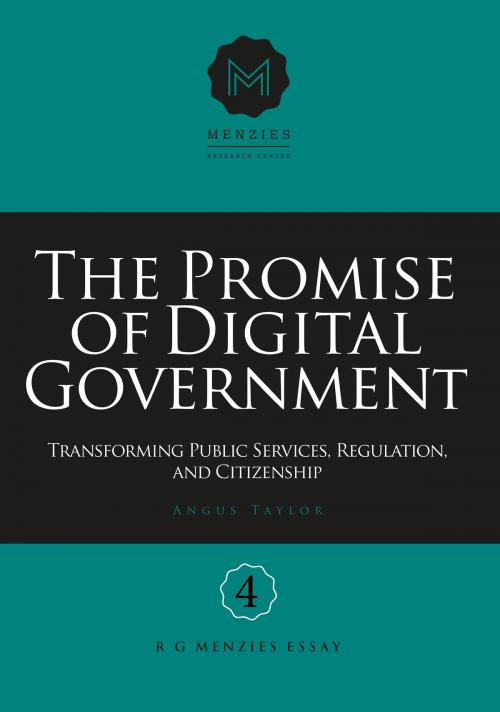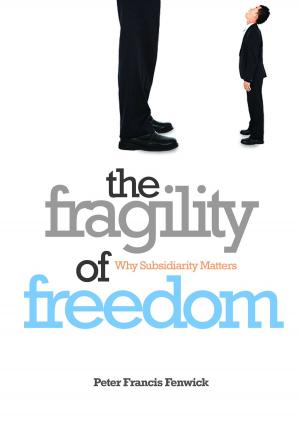The Promise of Digital Government: Transforming Public Services, Regulation, and Citizenship
Menzies Research Centre Number 4
Business & Finance, Economics, Free Enterprise, Nonfiction, Social & Cultural Studies, Political Science, Politics| Author: | Angus Taylor | ISBN: | 9781925501063 |
| Publisher: | Connor Court Publishing | Publication: | April 21, 2016 |
| Imprint: | Language: | English |
| Author: | Angus Taylor |
| ISBN: | 9781925501063 |
| Publisher: | Connor Court Publishing |
| Publication: | April 21, 2016 |
| Imprint: | |
| Language: | English |
When Prime Minister Malcolm Turnbull released his innovation statement late last year, he pledged that the Government would lead by example. The business of government must be digitally transformed to make dealing with government as easy as dealing with eBay. There was no reason, he said, why most transactions with government could not be conducted on smartphones. In The Promise of Digital Government Taylor charts a course to fulfill that pledge and, in the process, deliver leaner, more cost-effective services to Australians. The essay carries a powerful subtext: digital technology puts the customers in charge. Disruption can help restore the balance between the state and the individual; government services will become customer-focused; government’s direction will be driven less by bureaucrats and more by the wisdom of crowds; government are likely to become more transparent and accountable; government departments can morph from being data hoarders into data providers, offering open-source information that will fuel innovation in the private sector. Digital technology releases the power of Adam Smith’s invisible hand and vindicates Friedrich Hayek’s belief in the power of democratised knowledge.This e-driven transformation could make much government regulation redundant. In the era of Uber and the sharing economy, customers are empowered; companies that wish to survive need to meet customers’ needs, including for convenience and security, allowing markets to largely regulate themselves. Of course, we should expect resistance. The digital revolution is the enemy of top-down, centralised government, and those with vested interests in maintaining the status quo will fight back. We need firm leadership and relentless focus if digitisation is to achieve its potential in the public sector. The good news is that digital innovation has a momentum that is difficult to resist in a liberal, democratic and inventive country such as ours. In countless, subversive and exciting ways it puts the individual back in charge. With the right political leadership, digital disruption will create the kind of nation to which Menzies aspired, where progress is driven not by government departments by the creative genius of its citizens. There has never been a more exciting time for those who believe in freedom. From the Foreword - Nick Cater, Executive Director, Menzies Research Centre. About the Author: Angus Taylor was elected to Federal parliament in September 2013. The boundaries of his NSW seat of Hume were re-drawn (2016) to include some of the fastest growing population areas in southwest Sydney. With a strong interest in economics, Angus initially worked at a parliamentary committee level on reforming health, tax and agricultural policy and on telecommunications infrastructure. In February 2016 he was appointed Assistant Minister to the Prime Minister with special responsibility for Cities and Digital Transformation. Angus is keen for government to implement innovative deals with the private sector, which move more jobs closer to where people live and ensure a strong return for taxpayer dollars invested. He is a firm believer in government delivering more effective public services through digitisation. Prior to entering parliament in 2013, Angus was a Director at Port Jackson Partners where he was a strategy and business advisor to a number of global and Australian companies, as well as public sector organisations. Before this he was a partner at global consulting firm McKinsey & Co.
When Prime Minister Malcolm Turnbull released his innovation statement late last year, he pledged that the Government would lead by example. The business of government must be digitally transformed to make dealing with government as easy as dealing with eBay. There was no reason, he said, why most transactions with government could not be conducted on smartphones. In The Promise of Digital Government Taylor charts a course to fulfill that pledge and, in the process, deliver leaner, more cost-effective services to Australians. The essay carries a powerful subtext: digital technology puts the customers in charge. Disruption can help restore the balance between the state and the individual; government services will become customer-focused; government’s direction will be driven less by bureaucrats and more by the wisdom of crowds; government are likely to become more transparent and accountable; government departments can morph from being data hoarders into data providers, offering open-source information that will fuel innovation in the private sector. Digital technology releases the power of Adam Smith’s invisible hand and vindicates Friedrich Hayek’s belief in the power of democratised knowledge.This e-driven transformation could make much government regulation redundant. In the era of Uber and the sharing economy, customers are empowered; companies that wish to survive need to meet customers’ needs, including for convenience and security, allowing markets to largely regulate themselves. Of course, we should expect resistance. The digital revolution is the enemy of top-down, centralised government, and those with vested interests in maintaining the status quo will fight back. We need firm leadership and relentless focus if digitisation is to achieve its potential in the public sector. The good news is that digital innovation has a momentum that is difficult to resist in a liberal, democratic and inventive country such as ours. In countless, subversive and exciting ways it puts the individual back in charge. With the right political leadership, digital disruption will create the kind of nation to which Menzies aspired, where progress is driven not by government departments by the creative genius of its citizens. There has never been a more exciting time for those who believe in freedom. From the Foreword - Nick Cater, Executive Director, Menzies Research Centre. About the Author: Angus Taylor was elected to Federal parliament in September 2013. The boundaries of his NSW seat of Hume were re-drawn (2016) to include some of the fastest growing population areas in southwest Sydney. With a strong interest in economics, Angus initially worked at a parliamentary committee level on reforming health, tax and agricultural policy and on telecommunications infrastructure. In February 2016 he was appointed Assistant Minister to the Prime Minister with special responsibility for Cities and Digital Transformation. Angus is keen for government to implement innovative deals with the private sector, which move more jobs closer to where people live and ensure a strong return for taxpayer dollars invested. He is a firm believer in government delivering more effective public services through digitisation. Prior to entering parliament in 2013, Angus was a Director at Port Jackson Partners where he was a strategy and business advisor to a number of global and Australian companies, as well as public sector organisations. Before this he was a partner at global consulting firm McKinsey & Co.















